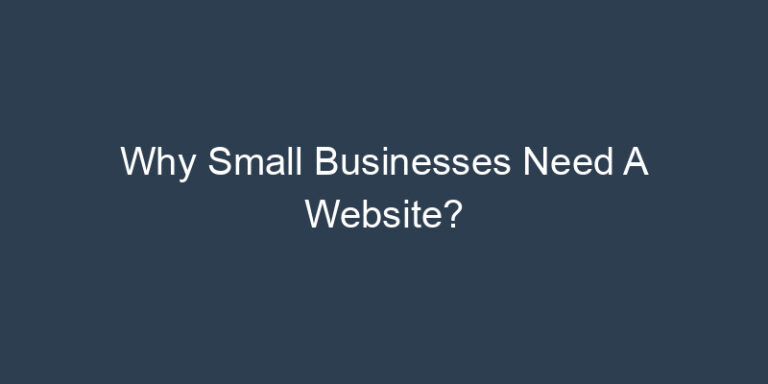Not having a website for your small business is like setting up shop without a sign—customers won’t know you exist. Whether you run a local restaurant, a retail store, or a service-based company, a website is crucial. It’s no longer just a “nice-to-have,” it’s a “must-have.”
1. Establish Your Online Presence
These days, people look for products and services online first. If your business doesn’t have a website, you’re invisible to many potential customers. It doesn’t matter if you’re the best at what you do—if you’re not showing up online, someone else will get the business.
Your website is like your digital storefront. It tells customers who you are, what you offer, and why they should choose you. It also gives you a chance to showcase your personality, which is tough to do with just social media or word of mouth.
2. Build Credibility
Let’s be real: businesses without websites are often seen as outdated or unprofessional. A website makes you look legitimate. It says, “Hey, I’m here to do business, and I take it seriously.” You wouldn’t trust a business card that was hand-written on a napkin, right? Same goes for businesses without websites.
Potential customers are searching for your business online, and if they don’t find you, they might assume you’re not legit or not worth their time. Worse, they might go with a competitor who does have a website.
3. Be Open 24/7
Your physical store may close at 6 PM, but your website? It’s open all day, every day. A website works for you around the clock, letting people browse your products or services even when you’re asleep. Imagine waking up to find an order or an inquiry from someone who visited your site at 3 AM—that’s the power of a website.
Plus, having a website means your customers don’t have to wait for business hours to get the info they need. This is especially handy if you’re selling products directly through your site.
4. Digital Marketing Opportunities
Once you’ve got a website, you open the door to a whole world of digital marketing. You can optimize your site for search engines (SEO) to make sure people find you when they search for products or services like yours.
You can also run ads directly to your website, track visitor data, and fine-tune your marketing strategies based on real numbers. Whether it’s Google Ads or social media ads, having a website makes your marketing efforts more effective and measurable.
5. Compete with the Big Guys
A well-designed website allows small businesses to punch above their weight class. It doesn’t matter if you’re competing against a giant chain or a local business down the street, your website can give you the same digital real estate as the big players.
With a strong website, you can use local SEO strategies to rank for specific searches relevant to your business. So when someone searches for “best coffee in [your town],” your website has a chance to be front and center.
6. Boost Sales and Revenue
The ultimate goal of any business is to make money. A website can significantly increase your sales, especially if you integrate e-commerce. Even if you don’t sell products directly online, your website can funnel leads and inquiries to your sales team, ultimately boosting your revenue.
A customer who lands on your website is already interested in what you offer. All you have to do is provide the right information, and boom—they’re ready to buy. Whether it’s booking a service or ordering a product, your website simplifies the process for both you and your customers.
7. Easy Customer Communication
Websites make it simple for customers to reach out to you. Whether it’s through contact forms, chatbots, or just a basic email link, people can ask questions, request quotes, or leave feedback. This opens the door to more business opportunities and helps you stay connected with your audience.
Plus, collecting customer feedback through your website can help you improve your business. You can learn what’s working, what’s not, and what your customers want more of. This kind of direct communication is invaluable.
8. Cost-Effective Advertising
Running a website is way cheaper than traditional advertising. You don’t have to spend thousands of dollars on billboards or newspaper ads. With a website, you can reach a targeted audience at a fraction of the cost. And if you’re using tools like Google Analytics, you can track every penny to make sure your marketing dollars are working as hard as possible.
9. Showcase Your Products, Services, and Expertise
A website is the perfect place to show off what you do. Whether it’s a gallery of your past work, a detailed list of your services, or an online store, your website is your space to shine.
Your potential customers want to know what they’re getting before they commit. Having everything laid out neatly on your website gives them the confidence to move forward with you, whether that’s hiring you for a service or buying a product.
10. Long-Term Growth
A website isn’t just for now—it’s an investment in your business’s future. As your business grows, your website can grow with it. You can add new products, services, or even new pages as your business evolves.
In the long run, your website helps future-proof your business. The world is only getting more digital, and having a strong online presence will help you stay relevant and competitive for years to come.
Conclusion
In 2024, if your business doesn’t have a website, you’re missing out. It’s the easiest way to attract new customers, showcase your offerings, and compete with bigger players. It’s time to get online.
If you’re ready to take the next step and get your website, whether you’re looking to buy, rent, or build, check out SB Website. They’ve got you covered.

